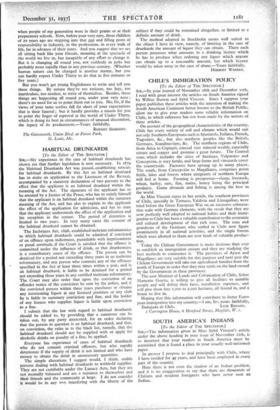HABITUAL DRUNKARDS [To the Editor of THE SPECTATOR.]
Sul,—My experience in the case of habitual drunkards has shown me that further legislation is now necessary. In 1879 the Habitual Drunkards Act was passed, establishing retreats for habitual drunkards. By this Act an habitual drunkard has to make an application to the Licensees of the Retreat, accompanied by a statutory declaration of two persons to the effect that the applicant is an habitual drunkard within the meaning of the Act. The signature of the applicant has to be attested by a Justice of the Peace, who has to satisfy himself that the applicant is an habitual drunkard within the statutory meaning of the Act, and has also to explain to the applicant the effect of the application for admission, and has to state that the applicant understands the effect of the application and his reception in the retreat. The period of detention is limited to two years. In very many cases the consent of the habitual drunkard cannot be obtained.
The Inebriates Act, 1898, established inebriate reformatories to which habitual drunkards could be admitted if convicted of an offence upon indictment, punishable with imprisonment or penal servitude, if the Court is satisfied that the offence is committed under the influence of drink, or that drunkenness is a contributory cause of the offence. The person can be detained for a period not exceeding three years in an inebriate reformatory, and any person who commits any of the offences specified in the Act at least three times within a year, and is an habitual drunkard, is liable to be detained for a period not exceeding three years in any certified inebriate reformatory. The Court may also order that upon the conviction of an offender notice of the conviction be sent by the police, and if the convicted person within three years purchases or obtains any intoxicating liquor at any licensed premises or any club he is liable to summary conviction and fine, and the holder of any licence who supplies liquor is liable upon conviction to a fine.
I submit that the law with regard to habitual drunkards should be added to, by providing that a summons can be taken out, by any party interested, for an order declaring that the person in question is an habitual drunkard, and that, on conviction, the rules as to the black list, namely, that the habitual drunkard should not be supplied with or apply for alcoholic drinks on penalty of a fine, be applied.
Everyone has experience of cases of habitual drunkards who do not commit criminal offences, but who rapidly deteriorate if the supply of drink is not limited and who have money to obtain the drink in unnecessary quantities.
The simple alterations I suggest would, I think, enable persons dealing with habitual drunkards to withhold supplies. They are not certifiable under the Lunacy Acts, but they are not mentally balanced and are a nuisance to themselves and their friends and the community at large. I do not consider it would be in any way interfering with the liberty of the subject if they could be restrained altogether, or limited to a definite amount of drink.
The method adopted in Stockholm seems well suited to the object I have in view, namely, of limiting in the case of drunkards the amount of liquor they can obtain. There each person possesses what amounts to a drinking licence which he has to produce when ordering any liquor which anyone can obtain up to a reasonable amount, but which licence would be taken away in the case of abuse.—Yours faithfully, HERBERT WARREN.
































 Previous page
Previous page